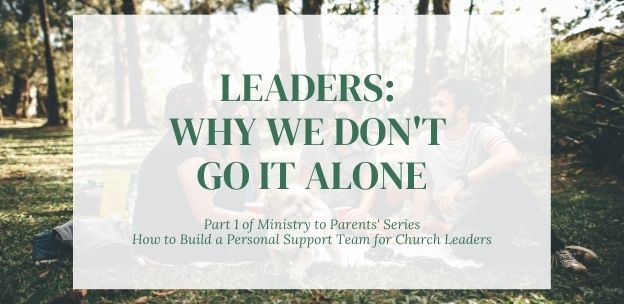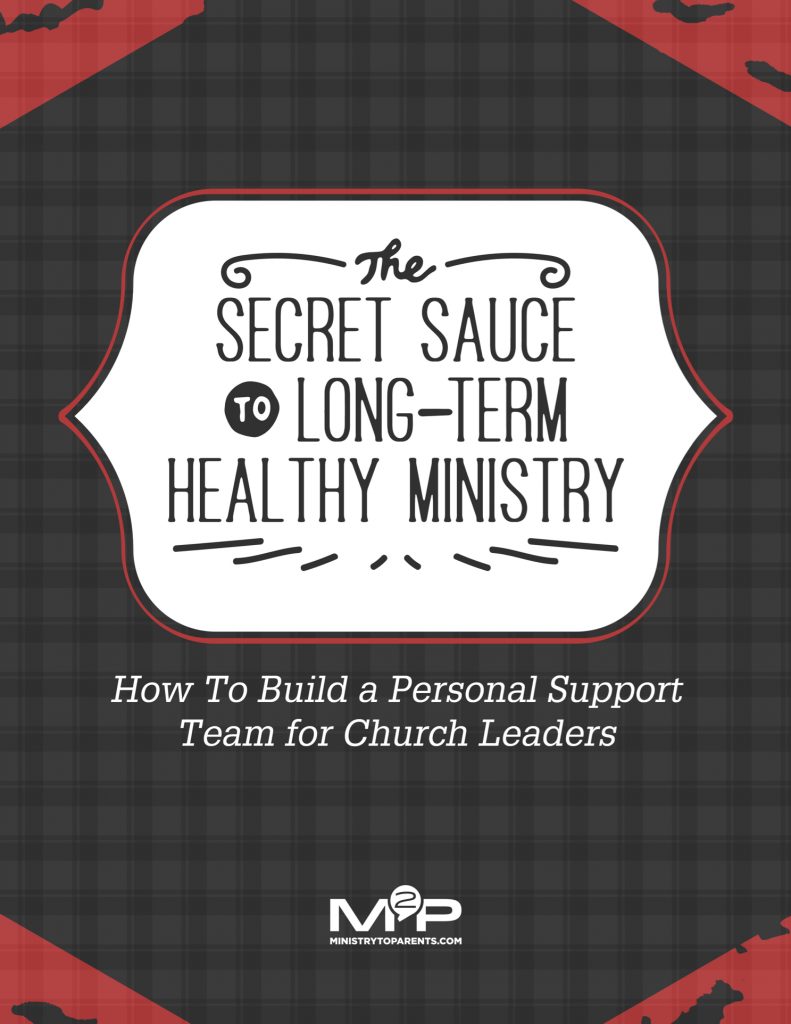TO LISTEN TO THE PODCAST ON THIS SERIES, CLICK HERE.
Do you hope to still serve people ten years from now? Did you step into ministry with an exuberance that is diminishing? At Ministry to Parents, we believe the secret for long-term healthy ministry is to assemble a group of people who care for you. Those who do see increased fulfillment in home and work plus minimize regrets. So we’ve created a series to help church leaders build a personal support team and to kick it off, we asked Amy Diller, a children’s leader from Michigan, to share her story on why we don’t go it alone.
LEADERS: WHY WE DON’T GO IT ALONE
I am a textbook firstborn.
My leadership skills were evident very early in life. My kindergarten teacher described my classroom behavior to my parents with these words: “She tends to be quite bossy.” Birth order books and articles describe my firstborn-ness perfectly: independent, responsible, high achiever, hard-working, etc. Not all the characteristics are positive, though. I also tend to be controlling, intensely afraid of failure, perfectionistic, and a people-pleaser. Additionally, I am naturally an introvert–I genuinely enjoy working and relaxing alone.
These personality characteristics push me toward doing everything by myself, making it difficult to rely on others.
I started my career as an elementary teacher in the public school system. Although there were built-in supports at the building and district level, my classroom allowed a lot of independence. I set the rules and procedures, planned and delivered lessons, and marked curriculum goals off on a list. A mentor teacher assigned to me offered support when I asked for it. I loved working with students, and I loved my little world. And then, 11 years ago, the Lord interrupted my teaching career with an invitation to full-time, vocational ministry.
I accepted.
In a new role as Director of Children’s Ministry at our church, my firstborn, introverted self didn’t quite know how to operate. I knew how to interact with kids, prepare engaging lessons, and deal with disciplinary issues. Still, I lacked the experience of working with fellow staff members whose ministry areas overlapped with mine.
Although I felt comfortable in a room full of children, I was unsure about leading a team of adult volunteers. There was no leadership guidebook, educational benchmarks to follow, or set curriculum. I needed help, and I needed to understand that my inability to do the work was not an indication of failure.
In Exodus 18, Moses’ father-in-law, Jethro, comes for a visit. Moses tells him about everything God had done to rescue Israel from Egypt, and Jethro rejoices and offers sacrifices to the Lord. The next day dawns, and Moses spends the entire day working as a judge for the people. Jethro observed what was happening, and he had some things to say. In verse 14, Jethro asks, “What is this you are doing for the people? Why do you alone sit as judge, while all these people stand around you from morning to evening?”
At this point in the story…
I like to think Jethro was doing what many parents do with their kids—asking a question to which he already knew the answer. And perhaps, like many kids, Moses’ response was a little defensive.
He replies in verse 15, “Because the people come to me to seek God’s will. Whenever they have a dispute, it is brought to me, and I decide between the parties and inform them of God’s decrees and instructions.”
Maybe Moses didn’t see any other way to run things, or perhaps he wanted to be the sole person in charge. We can only imagine the internal dialogue running in Moses’ mind.
For anyone (like me) whose inclination is to tackle everything alone, I believe the wisdom Jethro shared with Moses is especially noteworthy.
In Exodus 18:17-23, we read these words of instruction and encouragement,
“What you are doing is not good. You and these people who come to you will only wear yourselves out. The work is too heavy for you; you cannot handle it alone. Listen now to me, and I will give you some advice, and may God be with you. You must be the people’s representative before God and bring their disputes to him.
Teach them his decrees and instructions, and show them the way they are to live and how they are to behave. But select capable men from all the people—men who fear God, trustworthy men who hate dishonest gain—and appoint them as officials over thousands, hundreds, fifties and tens.
Have them serve as judges for the people at all times, but have them bring every difficult case to you; the simple cases they can decide themselves. That will make your load lighter, because they will share it with you. If you do this and God so commands, you will be able to stand the strain, and all these people will go home satisfied.”
Moses accepted Jethro’s advice.
No matter the level of talents and abilities, everyone needs help.
Recognizing the importance of choosing people to be on our team and allowing them to take an active part is a step in the right direction. Being a great leader doesn’t mean doing everything alone. Moses tried that, and Jethro wisely pointed out the long-term danger of continuing in that direction.
When we insist on being the only person who can do the job, the cost is high. Not only do relationships suffer, but we can also experience a negative impact physically, emotionally, mentally, and spiritually.
Without a support system, burnout is inevitable.
When the Lord called me to vocational ministry years ago, He did not call me to be a one-woman superstar…although I often told myself that’s what I needed to be to prove my worth.
He knew this role would stretch me, challenge my perception of achievement, and force me to face my fear of failure. I believe it was another invitation in life to unclench my white-knuckled grip on the steering wheel.
I’ve worn myself out countless times, giving in to the voice that loves to tell me anything short of relying on my abilities is failure. But the Lord continues to show me through friends, family, co-workers, and other ministry leaders, the beauty of inviting others into my circle to help shape me, pray with and for me, work alongside me, and remind me…
I am not alone in ministry.
Amy Diller began her career as an elementary teacher before moving into her current role of Co-Director of Children’s Ministry at Colonial Woods Missionary Church in Port Huron, MI. She is a life-long Michigander, wife to Jason, and mom to two college-aged daughters. Amy loves the smell of a new box of crayons, the feel of a book in her hands, and experiencing God’s Word through the eyes of kids.
M2P Members, grab your monthly resource on How to Build a Personal Support Team in Toolbox: Care for the Soul.
What is M2P Membership?
Ministry to Parents saves church leaders countless hours by producing digital “done-for-you” resources. Your monthly membership gives you access to the entire digital library including parent videos, e-books on anxiety, and more.


